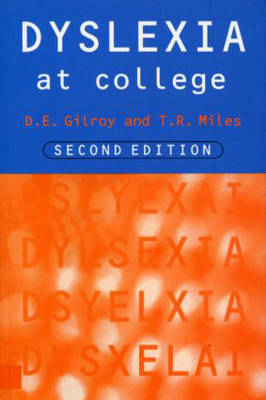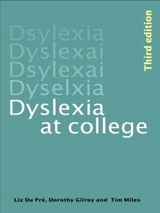
Dyslexia at College
Routledge (Verlag)
978-0-415-12778-3 (ISBN)
- Titel erscheint in neuer Auflage
- Artikel merken
The dyslexic's strengths and weaknesses. What is dyslexia? Reading, writing and spelling. Spoken language. Essays and examinations. Calculation. Social problems. Some encouraging research. A possible theory. Conclusions. Understanding your assessment. Introduction. The Disabled Student's Allowance. Reading and spelling. Intelligence. Other tests. A final word. The move to Higher Education. The student's wishes. Routes to Higher Education. Choosing between courses. Filing in the UCAS form. Taking more time? Interviews. Some good news. Preparations for college. A look ahead to possible difficulties. Learning to be independent. Organizing a filing system and other aids. Finance. Travel. Spoken language. Written language. The writing of business letters. Further preparations. Social and academic relationships. Establishing a routine. Do I tell other students that I am dyslexic? Coping with stress. Collaboration between student and tutor. Organizing a support service. Introduction. Publicity. Types of support. The tutor as counsellor. Study skills and the Support Tutor. On being both counsellor and academic tutor. How far should the Support Tutor take over? Three sample worksheets. Study skills and the student (1). Time management and self-organization. Where to study. Reading with understanding. Use of reading services. Reading lists. Coloured filters and coloured lenses. Study skills and the student (2). Some thoughts on note taking. Preparing for lectures. Note taking in lectures. Note taking from text. Concentration. Essays and assignments. Some of the difficluties. What is expected in a college essay? Reading the question. Reading for and planning the essay as a whole. Getting across what you want to say. Writing the rough draft. Paragraphing. Other types of assignment. Setting out references. Writing out the essay. Grammar and punctuation. Introduction. The simple sentence. Some key grammatical terms. Writing complete sentences. Complex sentences. Some common faults. Scientific writing. Spelling. Would tuition be helpful? Where to obtain help. Regularities in the English spelling system. Mnemonics and other aids. Technical terms. Aids and reference books. Advice to a trainee nurse. Mathematics and statistics. Dyslexia and mathematics. Do not be put off by symbols. Some more symbols: Algebra. Statistics. The use of common sense. Information technology. What are your needs? Portable equipment. Word processors and notebooks. Spell-checks and other software. Examination provision and its administration. Administrative arrangements. Common practices. Suggestions for further provision. Use of word processors. Preparing for examinations. Introduction. Long-term planning. Using your memory. Preparing lecture notes for revision. A revision card. The pre-examination revision period. You are now going into the learning phase. Sitting the exa
| Erscheint lt. Verlag | 7.12.1995 |
|---|---|
| Verlagsort | London |
| Sprache | englisch |
| Maße | 156 x 234 mm |
| Gewicht | 454 g |
| Themenwelt | Sozialwissenschaften ► Pädagogik ► Erwachsenenbildung |
| Sozialwissenschaften ► Pädagogik ► Sonder-, Heil- und Förderpädagogik | |
| ISBN-10 | 0-415-12778-5 / 0415127785 |
| ISBN-13 | 978-0-415-12778-3 / 9780415127783 |
| Zustand | Neuware |
| Informationen gemäß Produktsicherheitsverordnung (GPSR) | |
| Haben Sie eine Frage zum Produkt? |
aus dem Bereich



